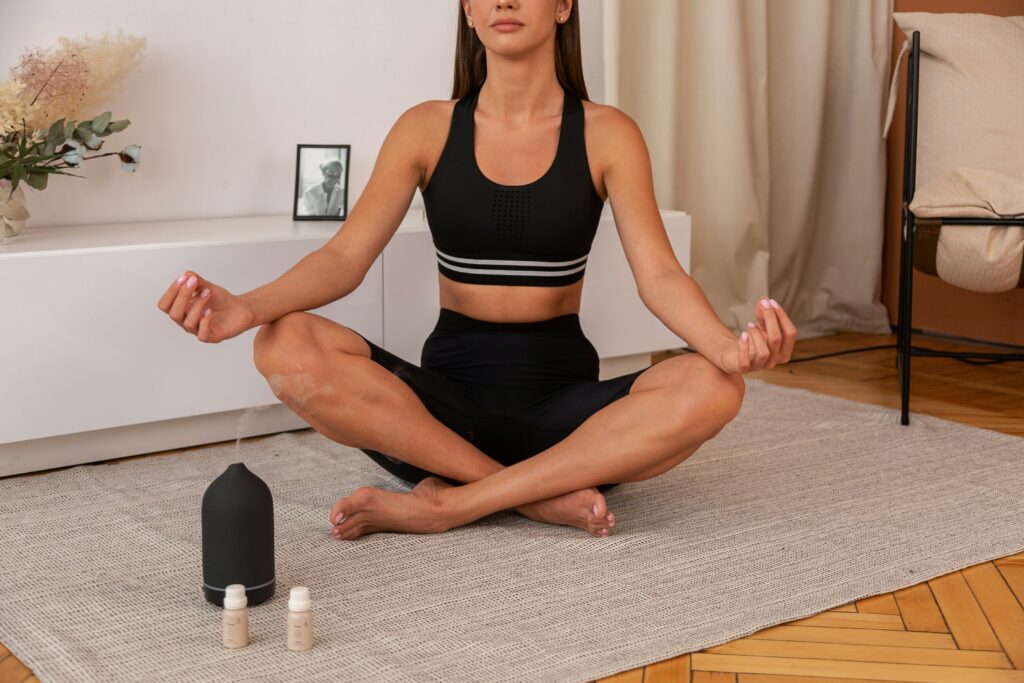In the bustling rhythm of modern life, stress has become an unwelcome companion for many Australians. But here’s a startling fact that might make you sit up and take notice: according to recent research by the Australian Psychological Society (APS), rates of psychological distress in 15-24 year-olds have skyrocketed from 18.4% in 2011 to a staggering 42.3% in 2021. That’s nearly half of our young adults grappling with significant stress and anxiety, a trend that ripples through all age groups and impacts our collective health, happiness, and overall quality of life.
But here’s the good news: you’re not powerless against stress. In fact, there’s a whole toolkit of natural stress management techniques that can help you reduce anxiety and reclaim your sense of calm. In this comprehensive guide, we’ll explore these techniques, giving you practical, evidence-based strategies to manage stress naturally. So, take a deep breath, and let’s dive in.

Understanding Stress and Anxiety: Know Your Enemy
Before we jump into solutions, let’s take a moment to understand what we’re dealing with. Stress isn’t just a feeling – it’s a complex physiological response that’s hardwired into our biology.
When we encounter a stressor, our body goes into “fight or flight” mode. The heart races, muscles tense, and a cocktail of stress hormones like cortisol and adrenaline flood our system. This response is brilliant for dealing with immediate threats (like our caveman ancestors facing a sabre-toothed tiger), but it’s not so great when activated chronically in response to everyday pressures.
And here’s where it gets really interesting: while acute stress can actually be beneficial, helping us rise to challenges, chronic stress is a different beast entirely. It’s like keeping your car engine revving at full throttle all the time – eventually, something’s going to wear out.
Chronic stress can lead to a host of health problems, including:
- Cardiovascular issues
- Weakened immune system
- Digestive problems
- Mental health disorders like anxiety and depression
- Sleep disturbances
- Cognitive impairment
But don’t worry – this isn’t a doom and gloom story. Understanding stress is the first step in managing it effectively. Now, let’s explore some powerful, natural techniques to keep stress in check.

Mindfulness and Meditation: Your Mental Gym
Imagine having a superpower that allows you to observe your thoughts and feelings without getting caught up in them. That’s essentially what mindfulness offers. It’s about being present in the moment, aware of your thoughts and surroundings, without judgment.
Meditation is a practical way to cultivate mindfulness. And before you picture yourself sitting cross-legged on a mountaintop, know that meditation can be much simpler and more accessible than that. Here are a few techniques to get you started:
- Breath Awareness: Simply focus on your breath, noticing the inhale and exhale. When your mind wanders (and it will), gently bring your attention back to your breath.
- Body Scan: Mentally scan your body from head to toe, noticing any areas of tension or discomfort. As you do this, try to relax each part of your body.
- Loving-Kindness Meditation: Focus on cultivating feelings of love and compassion, first for yourself, then for others.
But don’t just take our word for it. Science backs up the stress-busting power of meditation. A 2014 meta-analysis published in JAMA Internal Medicine found that mindfulness meditation programs showed moderate evidence of improving anxiety and depression.

Physical Exercise: Stress’s Natural Nemesis
We’ve all heard that exercise is good for us, but when it comes to stress management, it’s nothing short of a superstar. Physical activity is like a reset button for your stress response, helping to lower those stress hormones and replace them with feel-good endorphins.
But here’s the kicker: you don’t need to be a gym junkie or marathon runner to reap the benefits. Even moderate exercise can work wonders for stress relief. Here are some stress-busting exercises to consider:
- Aerobic exercises: Activities like brisk walking, jogging, cycling, or swimming can help reduce stress hormones and stimulate the production of endorphins.
- Yoga: Combining physical postures with breath control and meditation, yoga is a powerful stress management tool.
- Tai Chi: This gentle Chinese martial art combines flowing movements with meditation and deep breathing.
- Strength training: Lifting weights or using resistance bands can help reduce stress and improve mood.
The key is to find activities you enjoy and can stick with consistently. Even a 10-minute walk can make a difference. Remember, the best exercise for stress relief is the one you’ll actually do!

Nutrition and Stress Management: You Are What You Eat
The food we eat plays a crucial role in how we handle stress. A balanced diet not only supports overall health but can also help manage stress levels. Here are some nutrition tips for stress management:
- Complex carbohydrates: Foods like whole grains, fruits, and vegetables can boost serotonin production, a feel-good neurotransmitter.
- Omega-3 fatty acids: Found in fish, flaxseed, and walnuts, omega-3s may help reduce stress hormones.
- Dark chocolate: In moderation, dark chocolate can reduce stress hormones and improve mood.
- Green tea: Contains L-theanine, an amino acid that can promote relaxation without drowsiness.
- Fermented foods: Probiotics in foods like yogurt and kimchi may help reduce stress and anxiety.
Remember, while these foods can support stress management, they’re not a cure-all. It’s about creating a balanced, nutritious diet that supports your overall health and wellbeing.

Sleep Hygiene: The Overnight Stress Buster
Sleep and stress have a complicated relationship. Stress can make it harder to sleep, and poor sleep can increase stress. It’s a vicious cycle, but one you can break with good sleep hygiene. Here are some tips:
- Stick to a consistent sleep schedule, even on weekends.
- Create a relaxing bedtime routine.
- Make your bedroom a sleep sanctuary – cool, dark, and quiet.
- Limit screen time before bed (the blue light can interfere with your sleep-wake cycle).
- Avoid caffeine and alcohol close to bedtime.
Remember, good sleep isn’t just about quantity – quality matters too. Aim for 7-9 hours of restful sleep each night.

Time Management and Organisation: Taming the Chaos
Poor time management can be a significant source of stress. When we feel overwhelmed by tasks and responsibilities, our stress levels skyrocket. Here are some strategies to help you take control of your time:
- Prioritise: Use methods like the Eisenhower Matrix to categorise tasks based on urgency and importance.
- Break big tasks into smaller steps: This makes overwhelming projects more manageable.
- Use a planner or digital app: Tools like Trello or Asana can help you keep track of tasks and deadlines.
- Learn to say no: It’s okay to decline commitments that don’t align with your priorities.
- Practice the 2-minute rule: If a task takes less than 2 minutes, do it immediately rather than putting it off.
Remember, the goal isn’t to fill every moment with productivity. It’s about creating a balanced schedule that includes work, rest, and self-care.

Social Connections and Support: We’re Stronger Together
Humans are social creatures, and our relationships play a crucial role in stress management. Strong social connections can provide emotional support, practical help, and a sense of belonging – all of which can buffer against stress.
Here are some ways to nurture your social connections:
- Make time for friends and family regularly.
- Join clubs or groups related to your interests.
- Volunteer in your community.
- Consider joining a support group if you’re dealing with specific stressors.
Remember, it’s not about the quantity of relationships but the quality. Even a few close, supportive relationships can make a big difference in managing stress.

Natural Therapies: Ancient Wisdom for Modern Stress
Various natural therapies can complement other stress management techniques. Here are a few to consider:
- Aromatherapy: Essential oils like lavender, bergamot, and ylang-ylang may help reduce stress and promote relaxation.
- Acupuncture: This traditional Chinese medicine technique may help balance the body’s energy and reduce stress.
- Massage therapy: Can help relax tense muscles and promote overall relaxation.
- Plant-based medicines: Certain plant-based remedies have shown promise in managing stress and anxiety. While we won’t delve into specifics here, many people find theM helpful in their stress management journey.
Cognitive Techniques: Reframing Your Thoughts
Our thoughts play a powerful role in how we experience and respond to stress. Cognitive techniques can help us identify and change thought patterns that contribute to stress and anxiety. Here are a few strategies:
- Cognitive restructuring: Challenge and reframe negative thoughts. For example, instead of “I’ll never get this done,” try “This is challenging, but I’ll do my best and ask for help if needed.”
- Positive self-talk: Replace self-criticism with self-compassion and encouragement.
- Gratitude practice: Regularly noting things you’re grateful for can shift your focus from stressors to positives in your life.
- Visualisation: Imagine yourself successfully handling stressful situations or visualise a calm, peaceful place.
These techniques take practice, but over time, they can significantly change how you perceive and respond to stress.

Conclusion: Your Journey to Stress-Free Living Starts Now
We’ve covered a lot of ground in our exploration of natural stress management techniques. From mindfulness and exercise to nutrition and cognitive strategies, you now have a toolkit of evidence-based techniques to help you manage stress and reduce anxiety naturally.
Remember, stress management is not a one-size-fits-all approach. It’s about finding the combination of techniques that work best for you. And it’s a journey – be patient with yourself as you explore these methods and build new habits.
Start small. Perhaps begin with a few minutes of mindfulness practice each day, or a short walk after lunch. As you begin to feel the benefits, you can gradually incorporate more techniques into your routine.
Your well-being matters, and you have the power to take control of your stress. So why not start today? Your future, calmer self will thank you.



